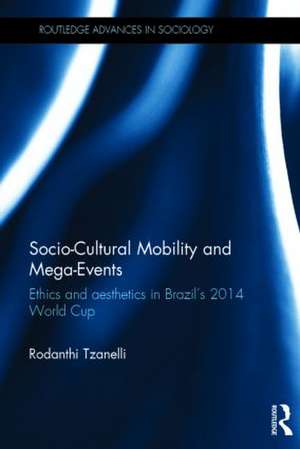Socio-Cultural Mobility and Mega-Events: Ethics and Aesthetics in Brazil’s 2014 World Cup: Routledge Advances in Sociology
Autor Rodanthi Tzanellien Limba Engleză Hardback – 20 apr 2015
In Socio-Cultural Mobility and Mega-Events, Tzanelli uses Brazil’s 2014 World Cup to explore how mega-events articulate socio-cultural problems. Critically examining the aesthetics and ethics of mobilities in the mega-event, this book explores these socio-cultural issues and controversies:
- the background of staging mega-events, including the bidding process and the host’s expectations for returns;
- ceremonial staging and communications between artistic representations and national symbolism;
- the clear reaction mega-events almost always generate in national, regional and global activist circles, including accusations of overspending and human rights violations.
| Toate formatele și edițiile | Preț | Express |
|---|---|---|
| Paperback (1) | 244.94 lei 6-8 săpt. | |
| Taylor & Francis – 30 iul 2018 | 244.94 lei 6-8 săpt. | |
| Hardback (1) | 670.62 lei 6-8 săpt. | |
| Taylor & Francis – 20 apr 2015 | 670.62 lei 6-8 săpt. |
Din seria Routledge Advances in Sociology
-
 Preț: 385.10 lei
Preț: 385.10 lei -
 Preț: 152.38 lei
Preț: 152.38 lei -
 Preț: 309.12 lei
Preț: 309.12 lei - 20%
 Preț: 296.87 lei
Preț: 296.87 lei -
 Preț: 334.09 lei
Preț: 334.09 lei -
 Preț: 204.46 lei
Preț: 204.46 lei - 9%
 Preț: 865.97 lei
Preț: 865.97 lei -
 Preț: 310.81 lei
Preț: 310.81 lei -
 Preț: 326.40 lei
Preț: 326.40 lei -
 Preț: 311.41 lei
Preț: 311.41 lei - 8%
 Preț: 388.97 lei
Preț: 388.97 lei -
 Preț: 288.87 lei
Preț: 288.87 lei -
 Preț: 311.33 lei
Preț: 311.33 lei -
 Preț: 311.41 lei
Preț: 311.41 lei -
 Preț: 303.42 lei
Preț: 303.42 lei -
 Preț: 301.50 lei
Preț: 301.50 lei -
 Preț: 326.63 lei
Preț: 326.63 lei -
 Preț: 152.29 lei
Preț: 152.29 lei -
 Preț: 311.41 lei
Preț: 311.41 lei -
 Preț: 309.94 lei
Preț: 309.94 lei -
 Preț: 316.13 lei
Preț: 316.13 lei -
 Preț: 152.99 lei
Preț: 152.99 lei -
 Preț: 334.09 lei
Preț: 334.09 lei -
 Preț: 309.46 lei
Preț: 309.46 lei -
 Preț: 386.77 lei
Preț: 386.77 lei - 8%
 Preț: 388.91 lei
Preț: 388.91 lei -
 Preț: 310.60 lei
Preț: 310.60 lei -
 Preț: 310.22 lei
Preț: 310.22 lei -
 Preț: 310.51 lei
Preț: 310.51 lei -
 Preț: 283.77 lei
Preț: 283.77 lei -
 Preț: 311.41 lei
Preț: 311.41 lei -
 Preț: 295.09 lei
Preț: 295.09 lei - 8%
 Preț: 383.57 lei
Preț: 383.57 lei - 18%
 Preț: 1111.55 lei
Preț: 1111.55 lei -
 Preț: 445.38 lei
Preț: 445.38 lei - 18%
 Preț: 701.88 lei
Preț: 701.88 lei - 18%
 Preț: 1053.92 lei
Preț: 1053.92 lei - 18%
 Preț: 1002.36 lei
Preț: 1002.36 lei - 18%
 Preț: 1057.89 lei
Preț: 1057.89 lei - 16%
 Preț: 248.31 lei
Preț: 248.31 lei - 18%
 Preț: 1003.30 lei
Preț: 1003.30 lei - 18%
 Preț: 1109.21 lei
Preț: 1109.21 lei - 18%
 Preț: 997.11 lei
Preț: 997.11 lei - 18%
 Preț: 1061.22 lei
Preț: 1061.22 lei - 18%
 Preț: 1058.06 lei
Preț: 1058.06 lei - 18%
 Preț: 1002.36 lei
Preț: 1002.36 lei - 18%
 Preț: 1113.12 lei
Preț: 1113.12 lei
Preț: 670.62 lei
Preț vechi: 788.97 lei
-15% Nou
Puncte Express: 1006
Preț estimativ în valută:
128.32€ • 134.32$ • 106.81£
128.32€ • 134.32$ • 106.81£
Carte tipărită la comandă
Livrare economică 31 martie-14 aprilie
Preluare comenzi: 021 569.72.76
Specificații
ISBN-13: 9781138860087
ISBN-10: 1138860085
Pagini: 208
Ilustrații: 5 black & white illustrations, 5 black & white halftones
Dimensiuni: 156 x 234 x 17 mm
Greutate: 0.47 kg
Ediția:1
Editura: Taylor & Francis
Colecția Routledge
Seria Routledge Advances in Sociology
Locul publicării:Oxford, United Kingdom
ISBN-10: 1138860085
Pagini: 208
Ilustrații: 5 black & white illustrations, 5 black & white halftones
Dimensiuni: 156 x 234 x 17 mm
Greutate: 0.47 kg
Ediția:1
Editura: Taylor & Francis
Colecția Routledge
Seria Routledge Advances in Sociology
Locul publicării:Oxford, United Kingdom
Public țintă
Postgraduate and UndergraduateCuprins
1. Cosmographies of riches and cosmologies of desire 2. Aesthetics and practical action: Euro-Brazilian clashes and harmonisations 3. Complementary articulations: characterising ideal human types and communities 4. The ceremonial script: from tropicalism and Brasilidade to cosmographic mobilities 5. A defeated people: the loss of riches and the return of debt 6. The script of post-colonial desire: positive excess, negative reciprocities
Notă biografică
Rodanthi Tzanelli is Associate Professor of Cultural Sociology at the University of Leeds, UK. She is author of over 60 papers and six monographs, including Heritage in the Digital Era: Cinematic Tourism and the Activist Cause (Routledge, 2013) and Olympic Ceremonialism and the Performance of National Character: From London 2012 to Rio 2012 (2013).
Recenzii
"Tzanelli’s masterful book supports the work of students, professional researchers and social scientists interested in globalization and mobilities. It should become a seminal work in cultural studies."
—Maximiliano E Korstanje, University of Palermo, Argentina, Tourist Studies, 2016
—Maximiliano E Korstanje, University of Palermo, Argentina, Tourist Studies, 2016
Descriere
This interdisciplinary book uses Brazil’s 2014 World Cup to explore how mega-events articulate socio-cultural problems. Critically examining the aesthetics and ethics of mobilities in the mega-event, this book explores these socio-cultural issues and controversies: the background of staging mega-events, including the bidding process and the host’s expectations for returns; ceremonial staging and communications between artistic representations and national symbolism; and the clear reaction mega-events almost always generate in national, regional and global activist circles, including accusations of overspending and human rights violations.
